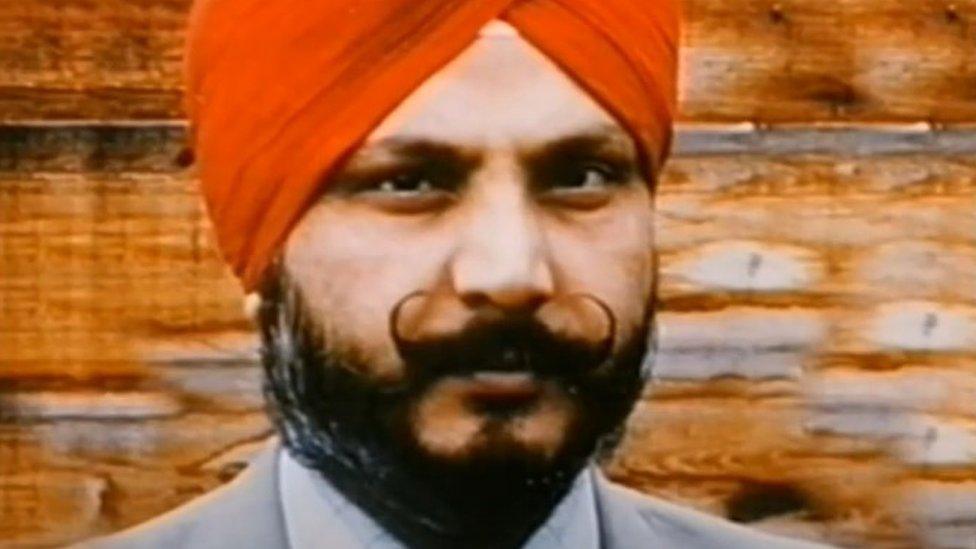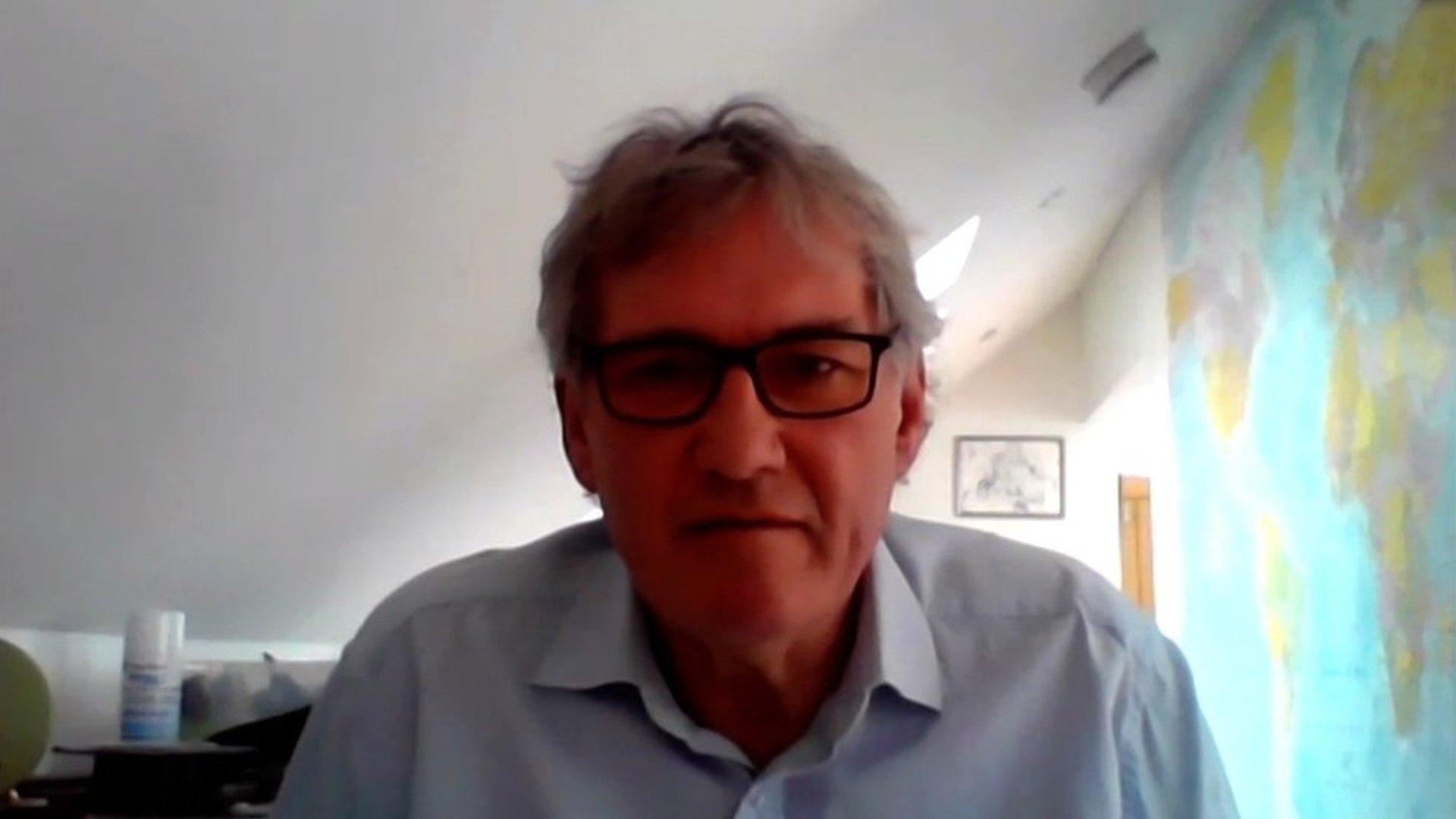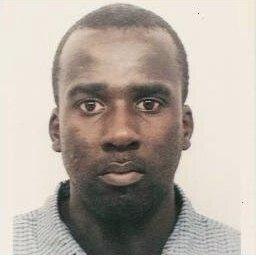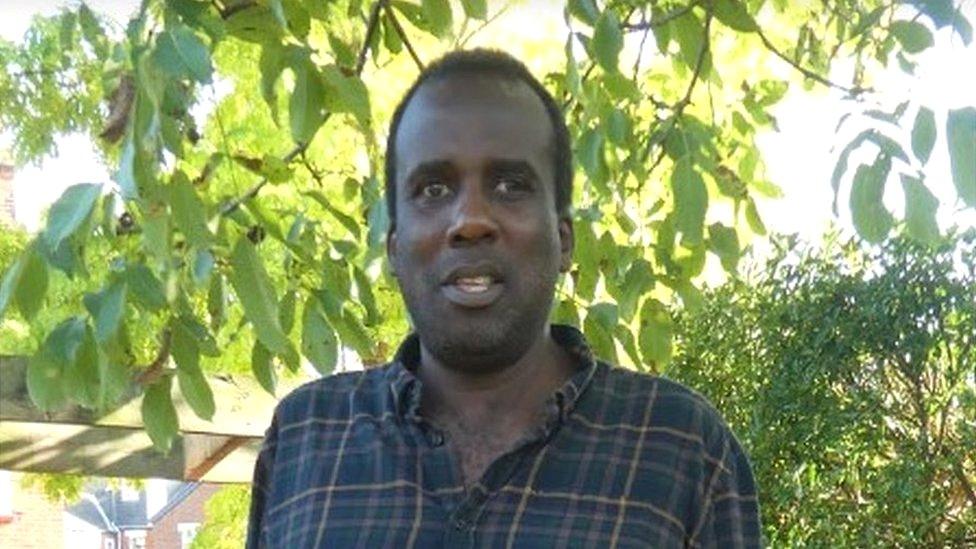Oliver Campbell: Calls to review 30-year-old murder conviction
- Published
Oliver Campbell talks to BBC Newsnight about his case.
A man with learning difficulties who admitted to a murder 30 years ago should have his conviction quashed because he confessed to police without a lawyer present, his solicitor says.
Oliver Campbell's confession would be ruled inadmissible today, Arthur Mullinger told BBC Newsnight.
Campbell, who was 19 at the time, says he was "put under pressure" to "admit to something that I didn't do".
Police say the interviews were fair, while a judge ruled them admissible.
Mr Mullinger believes officers failed to tell him that his client - who was accused of shooting dead a London shopkeeper - had waived his right to a solicitor because they realised that he would try to change Campbell's mind.
He told Newsnight: "The police did not have anything like sufficient evidence, probably even to get a prosecution off the ground, let alone a conviction without something more. And the more was going to be a confession."
Campbell, 50, who suffered a brain injury when he was eight months old, has always protested his innocence and has been fighting his conviction for many years. He was released from prison on life licence in 2002.
On 22 July 1990, two men entered a shop in east London intent on robbery. The owner, 42-year-old Baldev Hoondle, pressed a panic alarm before one of the men pulled out a gun and shot him in the head at close range.
Newsnight approached Mr Hoondle's family but they did not wish to participate in the programme.

Shopkeeper Baldev Hoondle was murdered in his off-licence in July 1990
Campbell - a local teenager - was arrested on suspicion of robbery and murder and brought in for questioning at Hackney police station.
On 1 December 1990, Mr Mullinger attended a police interview with his client alongside an appropriate adult from social services who was there because the police accepted that Campbell was mentally vulnerable.
Mr Mullinger and the appropriate adult left at around 6.30pm thinking interviews were over for the day, with Mr Mullinger saying that police officers had agreed to call him back if that changed.
The police say Campbell then decided to confess to murder and had waived his right to a solicitor.
Officers then brought his foster mother in to the police station and she agreed to become the appropriate adult for the new interview, which went ahead without Mr Mullinger's knowledge.
He told Newsnight he was misled and believes the police realised that getting a confession would be less likely if Campbell was legally represented.
He said: "The officer should have telephoned me and said, 'I think Oliver wants to speak to me. Will you come over to be part of the interview?' And I would have said, 'yes, of course'… And we would have had the interview.
"I don't know how that interview would have panned out, but it would have been undoubtedly a fair interview."

Arthur Mullinger believes Campbell's conviction should be quashed because the confession would be ruled inadmissible today
Campbell's foster mother, who was a magistrate, was so shocked by his confession to murder that she was physically sick. She said at the time that she felt manipulated by the police.
Newsnight obtained the original tapes of the police interviews conducted and traced the senior officer who interviewed Campbell in 1990.
The officer, who the BBC is choosing not to name, denies that the interview was unfair and told Newsnight he suspects Campbell is "in denial of murder", adding: "When he was interviewed by me, he had the assistance of a solicitor or an appropriate adult to look after him...
"It is correct he did not have a solicitor present when he confessed. However, his appropriate adult was present throughout and he had waived his right to have his solicitor."
He added: "His interview tape recordings were played at his trial and the jury had ample opportunity to consider whether or not his confession was genuine", and said this was "not the only evidence which incriminated him".
The officer said the interviews were tape recorded and conducted in accordance with the Codes of Practice issued under the Police and Criminal Evidence Act which applied at that time.
But Mr Mullinger and Campbell's current legal team say his conviction should be quashed because the confession would be ruled inadmissible today.
Glyn Maddocks and Michael Birnbaum have been fighting to clear Campbell's name for the past 20 years.

Oliver Campbell was 19 years old when he was convicted of murder in 1991
Mr Maddocks said: "Oliver Campbell is a mentally disabled person who was no match for a group of experienced and manipulative police officers.
"The 'admissions' Oliver made were inconsistent, varied noticeably from the evidence and in some places were quite absurd."
Mr Birnbaum QC said: "I can't prove this - this is a strong suspicion [but] I think they realised that they were never going to get an admission from him if a solicitor was present."
Campbell's confession statements were ruled admissible at his trial in 1991. Mr Birnbaum QC told Newsnight: "The trial judge conducted a hearing about whether to admit that statement - declare it admissible - and said that there had been no impropriety by the police.
"But I don't believe the defence counsel brought up any of these to my mind pretty obvious points that could be made about the unfairness of the police conduct."
The prosecution relied on three main strands of evidence apart from Campbell's confession:
An eyewitness picked him out - at the second attempt - at an ID parade
He was friends with the co-accused
His hat was found near the crime scene
But Campbell's lawyers say his confession was key, and there was no solicitor present for that.
'Put under pressure'
Campbell was released from prison after serving 11 years in 2002 and is now living in sheltered accommodation in Suffolk. He is still a convicted murderer, a label he says is ruining his life.
He told Newsnight that the police questioning was unfair, adding: "I was put under pressure… to say things that I didn't want to say at the end of the day… to admit to something that I didn't do. And I felt scared at the time."
Some of the police interview tactics were later described by an independent psychologist as "highly manipulative and relentless", while one of the questions lasted almost three minutes.
The case is now being reviewed by the Criminal Cases Review Commission (CCRC) for the second time. In 2005, it decided not to refer it back to the Court of Appeal. A key reason for this was that it argued that many of the apparent weaknesses in evidence had already been considered by the courts.
Mr Birnbaum QC says there are fresh grounds today, both on the detail of the evidence and the circumstances surrounding Campbell's confession.
He said: "The law and practise in regard to the way that mentally challenged suspects and defendants are treated has changed very considerably in their favour.
"Today his interviews would never be heard by a jury because of the unfairness of the police questioning and because I don't think the prosecution could prove that he understood the implications of being interviewed without a solicitor."
A spokeswoman for the Metropolitan Police said: "The case was fully investigated at the time with a range of evidence brought before a jury who convicted the defendant in 1991.
"We are aware this matter is with the Criminal Cases Review Commission and therefore it would not be appropriate to comment further at this stage."
Watch the full report on Newsnight at 22:45 GMT on Tuesday 16 March on BBC 2 or later on iPlayer.
Related topics
- Published28 September 2020
